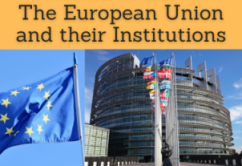European Parliament. Legislative Procedures
Legislative power of the European Parliament (European Union) procedures
- Introduction to the European Parliament (EU)
- Objectives of the European Parliament
- Legislative power of the European Parliament
- The four main legislative procedures
Sample - European Parliament:


The educational aims of the Subject “European Parliament” are the following:
- To understand the key role of the European Parliament
- To learn about legislative capacity of the European Parliament
- To analyze the main legislative procedures

The Subject “European Parliament” is included within the curriculum of the following academic programs at EENI Global Business School:

Masters: International Business, Foreign Trade.

Languages:  or
or  Parlamento Europeo
Parlamento Europeo  Parlement européen
Parlement européen  Parlamento Europeu.
Parlamento Europeu.

The European Parliament is an institution of EU whose main objective is to legislate, establish the budgets of EU and to promote the human rights and peace in the EU and around the world.
The European Parliament and the European Council adopt most of the European Union's laws on issues such as economic governance, energy, transport, environment, immigration or consumer protection.
The European Parliament, as a forum for a political debate, is made up of deputies representing all the EU member states, these deputies are elected by universal suffrage in each country, representing 500 million Europeans.
The European Parliament plays a key role in the election of the President of the European Commission.
All Countries of EU are members of the European Parliament.
(c) EENI Global Business School (1995-2025)
Top of this page









 WhatsApp
WhatsApp